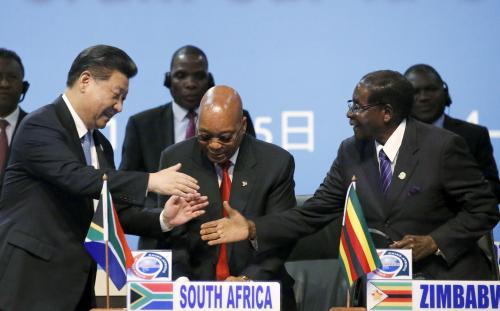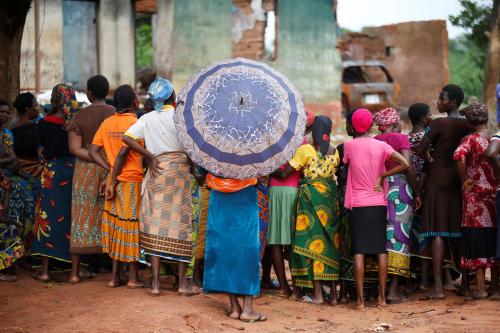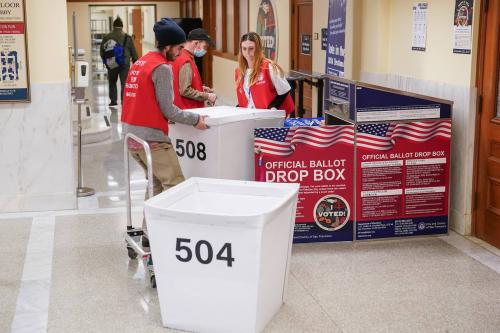Violence erupts after Gabon’s election commission announces a close win for incumbent President Bongo
On Wednesday, August 31, Gabon’s interior ministry declared incumbent President Ali Bongo, son of former long-ruling president Omar Bongo, the winner of last week’s election, spurring supporters of the opposition candidate, Jean Ping, to protest. The race was extremely tight, with only 5,594 votes separating the candidates. Bongo won 49.80 percent of the vote while Ping won 48.23 (Gabon has a one-round, first-past-the-post presidential election). Protests have been immediate and intense, with tear gas and stun grenades used as protestors attempted to storm the election commission’s offices. By Wednesday night protesters had set the parliament building on fire. By Thursday night, 1,000 people had already been arrested, three had been killed, and widespread looting had occurred in the capital Libreville. According to The Guardian, the headquarters of Ping’s opposition party have been stormed and bombed by Gabon’s presidential guard. In addition, Quartz Africa reports that the government has shut down the internet.
Many of Ping’s supporters were caught by surprise, as Ping had declared himself the winner earlier in the week before the official decision had been announced. Indeed, some questions linger: According to al-Jazeera, the largest discrepancy seems to be in the province of Haut-Ogooue, which reported a turnout of over 99 percent—compared to the country average of 59.46 percent—as well as a 95.5 percent win for Bongo.
The international community has expressed concern over the protests and security response, urged calm, and asked for greater transparency in the results. The European Union, which monitored Gabon’s election, has called for the country to release the results of all the polling stations. Similarly, France released a statement saying, “We think it is necessary to publish the results of all the polling stations. The credibility of the election as well as Gabon’s international reputation are at stake.” The U.S. Embassy in Gabon also stated—via Facebook—that the election did experience “many systemic deficiencies and irregularities,” and has echoed France’s call for transparency in the results.
Nairobi TICAD VI builds support between African and Japanese leaders
Japan’s Sixth Tokyo International Conference on African Development (TICAD VI) was held for the first time within sub-Saharan Africa, in Nairobi, Kenya on August 27 and 28, 2016. An estimated 10,000 delegates participated in TICAD VI—including 36 heads of state or their representatives from 54 African countries and Japan, as well as representatives from the African Union, United Nations, and other countries—to discuss deepening Africa-Japan partnerships in six critical areas for African development (as identified during TICAD V): economic growth, infrastructure development, agriculture and farming, peace and security, and social inclusivity.
At the opening of TICAD VI, Prime Minister Shinzo Abe of Japan committed to spending $30 billion in Japanese public and private sector investment in Africa over the next three years to boost infrastructure development, stating, “This is an investment that has faith in Africa’s future, an investment for Japan and Africa to grow together.” Meanwhile, at least 75 Japanese businesses attended the conference to exhibit their products and promote trade and investment ties with African countries, and 73 memorandums of understanding were signed throughout the two-day event.
To close the conference, Japan and African heads of state and government adopted the Nairobi Declaration, which pledged Japan’s support for the region’s efforts at economic structural reform and diversification; health system strengthening and the management of infectious diseases; and promotion of social stability and counterterrorism measures. President Uhuru Kenyatta of Kenya expressed gratitude to the conference’s organizers, declaring that “TICAD has evidently elevated the quality of life right across the continent of Africa and brought very critical focus on African development to the wider international community.”
As many observers applauded Japan’s efforts to advance engagement with sub-Saharan Africa, others including Mr. Zhang Ming, China’s vice-minister for foreign affairs, offered a dose of skepticism regarding the conference’s outcomes, stating “There is a never shortage of conferences and promises for Africa, and yet action and implementation have not always followed… We hope Africa’s partners will honor their commitments with real actions and deliver tangible fruits to the African people.” A recent blog post by AGI Nonresident Fellow Yun Sun, Rising Sino-Japanese competition in Africa, offers further insight on China and Japan’s growing competition in Africa as business and development partners with the region, arguing that “China should look inward on how to improve its own contributions in Africa rather than point fingers at other countries for doing more.”
Mark Zuckerberg visits tech startups in Nigeria and Kenya
This week, Facebook CEO and creator Mark Zuckerberg made a surprise visit to Lagos, kicking off his first trip to sub-Saharan Africa. He started his tour in Yaba, referred to as the “Nigerian Silicon Valley,” where he visited the Co-Creation Hub, a local innovation center, and met with kids attending a summer coding camp. He also connected with the developer behind Lifebank, an app (developed within the Co-Creation Hub) used to locate available blood supplies and transport them to hospitals in need. He also visited Andela—an African startup that trains young developers in Africa—in which the Chan Zuckerberg initiative invested $24 million last June. He also visited Afrinolly, a Nollywood movie studio. Zuckerberg praised the Nigerian film industry as “one of the best resources in the world for African content.”
After his time in Lagos, he flew to Nairobi, as he wrote on Facebook, to “meet with entrepreneurs and developers, and to learn about mobile money—where Kenya is the world leader.” Zuckerberg is currently launching a very ambitious plan which aims to provide free high-speed internet in rural parts of sub-Saharan Africa, with a specific focus on Nigeria and Kenya. However, just Thursday morning, this plan hit a major speed bump as the satellite that would be used to implement this plan was destroyed during a Space X explosion in Florida.





Commentary
Africa in the news: Disputed vote leads to electoral violence in Gabon, TICAD VI heightens Africa-Japan cooperation, and Facebook CEO visits African tech hubs
September 2, 2016